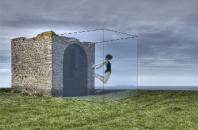Climate Change in Residence: Future Scenario
Date uploaded: May 25, 2016
Culture and Climate Change, a collaboration between the University of Sheffield, The Open University and the Ashden Trust is pleased to announce Emma Critchley, Lena Dobrowolska & Teo Ormond-Skeaping and Zoë Svendson as the selected artists for Climate Change in Residence: Future Scenarios.
Working with artists’ moving image, photography, installation, theatre and performance, the chosen artists will undertake a new kind of residency programme which embeds them within climate research and policy knowledge networks, rather than within one institution. They will engage with climate scenarios, and explore and extend the ways in which society engages with the range of possible future climates. Supported by Jerwood Charitable Foundationt, each of the artists will receive an award worth £10,000 for a year-long residency beginning in June 2016.
Said Shonagh Manson, Director of Jerwood Charitable Foundation, “These networked residencies will put culture and artistic practice at the heart of conversations about our climate futures. The artists selected have demonstrated a keen hunger for dialogue and exchange around these issues, which passionately inform their work. These residencies will harness the imaginations of talented artistic individuals for the benefit of the scenario planning network whilst simultaneously providing a unique research environment in which each artist can further their own practice and projects.”
Emma Critchley is an award-winning underwater visual artist working with photography, film, sound and installation who has exhibited internationally and nationally. Concerned with the human relationship with the underwater environment, she has recently undertaken residencies in New York, Barbados and Singapore. Critchley will use the residency to explore the psychological impacts of sudden flooding and how seismic events shift people’s perceptions of the world, especially within the scenario of the Anthropocene.
Said Critchley, “This residency is a fantastic opportunity to collaborate with a diverse reach of climate researchers, using scenarios as a way to distill the complex and multi-faceted research involved in climate change and create imagined spaces that allow room to stop, reflect and invite challenge and debate.”
Lena Dobrowolska & Teo Ormond-Skeaping are a Polish-British artist collaboration working with conceptual documentary photography and artists’ moving image who have won many awards and prizes, and exhibited across Europe. During the residency they will investigate their interests in glacial recession, climate induced migration, drowning islands, the psychological pressure of climate change and the prognosis of a difficult future scenario, amongst other issues.
Said Dobrowolska & Ormond-Skeaping, “We are working with the Anthropocene and climate change as a cultural paradigm of our time that shapes the way in which we imagine our future. Over the course of the residency we intend to utilise current climate, environmental, geological, economic and socio-political phenomena to illustrate the visceral reality of different hypothetical future scenarios.”
Zoë Svendsen is an internationally renowned theatre director and dramaturg who creates research-driven interdisciplinary performance projects exploring contemporary political subjects. She has worked with the Royal Shakespeare Company, the Young Vic, New Wolsey Theatre where she is Associate Artist, TippingPoint and the Max Planck Institute for the History of Science in Berlin amongst many others. Following her recent performance project, World Factory, Svendsen will use her residency to further explore the relationship between ethics and action, the economics of climate change and the tragic absence of real action against it.
Said Svendsen, “I am very excited by the residency – both by the idea of the ‘network’, and also by the chance to think more fully about the future, and the implications for human interactions that are implied in climate change scenarios, but which often are not fully fleshed out.”
Culture and Climate Change is a series of events, podcasts and publications bringing together leading researchers, artists, producers and journalists including Nick Drake, Roger Harrabin, Ruth Padel, Oliver Morton and Marina Warner to discuss ideas around culture and climate change. It was set up in 2009 by Joe Smith, Professor in Environment and Society at The Open University; Renata Tyszczuk, Senior Lecturer at the University of Sheffield School of Architecture, and Robert Butler, Open University researcher and trustee of the Ashden Trust.
Details of exhibitions, performances and other events that evolve from Climate Change in Residence: Future Scenarios will be announced on www.cultureandclimatechange.co.uk.

